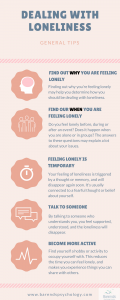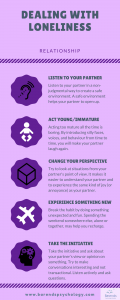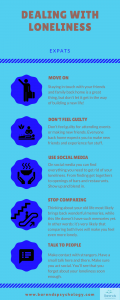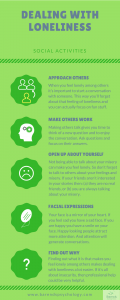What is loneliness?
Loneliness is not the same as being alone. Being alone is a fact. Loneliness, however, is a feeling. You can feel lonely when you are with friends or with your partner. At the same time you don’t need to feel lonely when you are alone. Dealing with loneliness is all about changing the feeling of being lonely. Becoming active and fighting depressing thoughts is one way of dealing with loneliness. On this page you’ll find all others ways of dealing with loneliness.
Loneliness is something everybody can experience from time to time. Expats can feel very lonely when they just moved abroad, because they don’t have (their) friends and family in their new town (yet). Loneliness is also common in relationships when the focus is more on work instead of each other. And sometimes people even feel lonely on parties or other social events. Loneliness can be confusing and anxious. When people feel lonely they often feel down, insecure, distressed, abandoned and as if they don’t belong.
Even though people can feel lonely in different settings, there is a common factor: loneliness is a feeling. Feelings don’t last forever and feelings can be changed by yourself or with the help of a professional. For some peope the tips on this page are enough to move on. For others counseling may be helpful. With a counselor you can search for the source of that feeling and take it from there. Sometimes this feeling of loneliness goes way back to your childhood. In that case dealing with loneliness on your own isn’t recommended.
At Barends Psychology Practice, counseling is offered for those who have difficulty dealing with loneliness. Schedule a first, free of charge, appointment: contact us. (Depending on your health insurance, treatment may be reimbursed).
For more information about relationship issues:
Dealing with loneliness.
There are a few things you can do in regard to dealing with loneliness. Some things should be done by everyone who experiences loneliness regardless their specific situation. However, not every tip works in every situation. So for those tips that work only in specific situations I’ve created a special paragraph.
Dealng with loneliness – General tips.
- Find out why you are feeling lonely. Are you feeling lonely because you recently lost someone? Are you feeling lonely because you feel like you don’t belong? Do you feel lonely because you think no-one loves you or wants to hang out with you? Or is it pehaps due to your recent move? Finding out why you’re feeling lonely may help you determine how you should be dealing with loneliness.
- Find out in which situations you are feeling lonely. Are you feeling lonely around your partner, after intercourse. Or perhaps when you are with friends? Or do you feel lonely when you are on a party? Perhaps it’s an idea to write down about your feelings of loneliness when you are feeling lonely. Keep a short diary.
- Realize that loneliness is a feeling. This feeling was triggered by a thought or memory (the thought of having no friends, no-one to share this experience with). Usually this thought or feeling represents a fear you have and fears are labeled a threat in your mind. By realizing that loneliness is a feeling and that this feeling comes from a memory or thought, makes it easier for you to fight that memory or thought.
- Talk to someone about your feelings of loneliness and, if possible, about what triggers these feelings. This can be a friend or a professional. By reaching out to others you experience the social connection and forget about those feelings of loneliness.
- Distract yourself when you feel lonely. Distracting yourself is a quick and effective way of dealing with loneliness. Talk to people, think about work, watch a movie or go to the mall. Focussing on other things makes it impossible to keep thinking about feeling lonely. Be aware that this may only be a short term solution. Try to find out what triggers your feeling of loneliness.
- Become more active. Find a nice hobby to occupy yourself with or rediscover an old hobby of yours. Perhaps you can find a club or group to turn to. Spending time on your hobby is a time well spent. And talking about it with alike minded people will teach you new stuff and give you a better feeling in general.
Dealing with loneliness – Relationship.
More than half of the people in a relationship feel lonely at some point in their relationship. Loneliness in relationships doesn’t occur suddenly, but is a slow process. Perhaps your partner is working a lot lately, or he is under a lot of stress. Or maybe you’ve simply run out of topics to talk about (this is often the case when couples do everything together). Slowly your communication becomes transactional: “Dinner is ready”, “A package arrived today”, “Please, buy bread on your way home”. You don’t need to be a scientist to realize that you guys soon will spend your evenings doing different stuff. He may watch television, while she plays a game on the Ipad. Dealing with loneliness in relationships requires a slightly different approach:
- Take initiative. By sitting and waiting, you’ll see that nothing ever changes. Instead, take the initiative and ask about your partner’s view or opinion on something. Try to make the conversations interesting and not transactional. Make sure you really listen to your partner’s opinion and ask a few questions. The first few times your partner may not want to participate, but you’ll see that patience pays off.
- Change your perspective. Try to figure out what your partner likes about the things he does. Try to see his activity through his eyes and leave your judgement behind. Perhaps by taking your partner’s perspective you can actually enjoy the things he likes as well.
- Experience something new. Perhaps it’s a good idea to spend a day with friends or outside. This way you guys both experience something different. When you come home you have something to talk about. For some couples it really helps to have some time off. Not only to recharge, but also to experience things without having their partner with them all the time.
- Do things together. For those couples that hardly spend time together: invite your partner for a walk, a dinner, or watch a movie together. Doing things together may spice up your life a little. For some couples it’s fun to cook something together and enjoy the result.
- Listen to your partner. By listening to your partner and by not judging your partner’s actions you create a safe environment. A safe environment allows your partner to open up and talk. When a partner is too judgemental it is difficult to talk about things. It’s annoying to hear your partner’s opinion even before you finished your story.
- Act young/immature. This sounds a bit weird, but acting a bit immature/childish can be a lot of fun for the both of you. You can tease each other a little bit, put on a funny voice and so on. Acting too mature all the time can be very boring and takes away all the joy in a relationship.
If you have a feeling that these tips won’t help you or your relationship, then consider consulting a counselor. Together with a counselor you can talk about your feelings of loneliness and find a solution.
(Advertisement. For more information, please scroll down.)
Dealing with loneliness – Expats.
Moving abroad or to a new town is exciting, but can also be a bit depressing. Leaving your friends and family behind can become a big problem for some expats. Not all friends like to stay in touch via Skype, Whatsapp or Viber. Others are too busy or simply forget to reply to your stories or messages. And then, suddenly, you are all alone. The new things you experience, the culture shock and the new people you meet… it’s wonderful to share them with others, but it’s not the same through internet… here are a few handy tips in which dealing with loneliness may go easier.
- Move on. It’s great to stay in touch with your friends and family, but don’t let it stop you from moving on. You can keep your old life next to your new life. Be open for new experiences, people, food and habits.
- Don’t feel guilty. Some expats feel guilty when they move on with their life and make new friends. This feeling of guilt only works suffocating. Because of this guilt you may end up not making friends or even hiding things for your friends and family. Don’t feel guilty for attending events or making new friends. Everyone back home expects you to make new friends and experience fun stuff. When you start a new life you experience a lot of great and difficult moments. You deserve to enjoy those moments without feeling guilty.
- Don’t be jealous of the people back home. The lives of your friends and family goes on, despite the fact that you’re gone. And they’ll probably tell you all about their adventures and activities. It’s natural that you feel a little jealous of them, but don’t let it ruin your mood or day. In stead, try to be happy for them.
- Stop comparing. Comparing your old life with your current life doesn’t make you feel any better. Thinking about your old life most likely brings back wonderful memories, while this life doesn’t have such memories yet. In other words: it’s very likely that comparing both lives will make you feel even more lonely.
- Find things to do. Go out and visit local bars and clubs. Enroll in social activities and groups. Dealing with loneliness is easier when you have a full agenda.
- Use social media to meet up with people. On social media you can find everything you need to get rid of your loneliness. From finding get togethers to openings of bars and restaurants. Show up and blend in.
- Talk to people. Make contact with strangers. Have a small talk here and there. Make sure you act social. You’ll see that you forget about your loneliness soon enough.
- Search for people from your own country. It’s easier to express yourself in your own language. And it’s easier to talk to someone with a similar culture and up bringing. Share experiences and ask for tips.
For more information about common expat problems: go to Expat problems.
(Advertisement. For more information, please scroll down.)
Dealing with loneliness – Social activities.
Some people feel lonely when they are with friends or at a party. They may feel like they don’t belong or think that they have too little friends. Sometimes they may be insecure about their appearance or have the feeling that they are boring company. Looking at other people having fun may lock you up inside yourself. Negative thoughts about yourself may make it difficult to get out of this process. Dealing with loneliness during social activities will make you feel connected with others again. Here are a few tips and tricks that make dealing with loneliness easier for you.
- Find out what made you feel lonely among others. Do you feel insecure about yourself? Do you have a feeling no-one is interested in you? Or do you think that others have more friends than you do? Finding out what it is that makes you feel lonely among others makes dealing with loneliness a lot easier. If it’s all about insecurity, then professional help could be very helpful.
- Don’t wait for others to talk to you. When you feel lonely among others it’s important to start a conversation with someone. This way you’ll forget about that feeling of loneliness and you can actually focus on fun stuff. Expecting others to come to talk to you is not the way to be dealing with loneliness, and you’ll most likely get disappointed when no-one comes to you.
- Make the other talk. If you have difficulty keeping a conversation going try to ask open questions and focus on the other. Click here for more information about conversation skills. Making others talk gives you time to think of a new question and to enjoy the conversation. On top of that: you are in charge. You decide where you want the conversation to go, deepen your connection with that person and make that person feel good in general. By talking too much yourself you are not in charge of the conversation. Either you are having a monologue or you have to answer questions. This means you are working all the time to keep the conversation going and it’s less likely that you enjoy the conversation.
- Don’t forget to talk about your issues as well. Some people are great listeners and have friends who only talk about their misery. Not being able to talk about your misery can make you feel lonely. So don’t forget to talk to others about your feelings and misery. If your friends aren’t interested in your stories then: (a) they are no real friends, or (b) you are always talking about your misery.
- Think of your facial expression. Your face is a mirror of your heart. If you feel sad you have a sad face. If you are happy you have a smile on your face. Happy looking people attract more attention. And attention will generate conversations. A good way of getting a happy face is to think of something you really enjoy, you really look forward to or something that make you laugh a lot.




